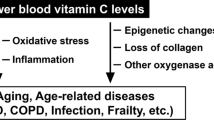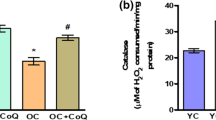Abstract
Curcumin, a strong natural compound with numerous health benefits, is extracted from the Curcuma longa. According to recent research findings, it also acts as a calorie restriction mimetic. We examined established aging biomarkers in erythrocytes and plasma and tested a persistent oral dietary dose of curcumin in young and d-galactose-induced accelerated rat aging models. For four weeks, d-gal (300 mg/kg b.w. subcutaneously) and curcumin (200 mg/kg b.w. oral) were administered simultaneously to test the protective effects of curcumin against d-galactose-induced accelerated aging and oxidative stress. In the accelerated senescent rat model, we discovered a significant rise in protein carbonyl, malonaldehyde (MDA), and advanced oxidation protein products. Increased levels of catalase, superoxide dismutase, ferric-reducing antioxidant potential, and reduced glutathione (GSH) were observed. Our findings reveal that curcumin has characteristics resembling a calorie restriction mimic and can successfully maintain redox equilibrium throughout the aging process in rat erythrocytes and plasma.



Similar content being viewed by others
Data availability
Supplementary data to this article can be found online at https://doi.org/10.17632/h9bpcnkrt7.1
References
Adewale OO, Samuel ES, Manubolu M, Pathakoti K (2019) Curcumin protects sodium nitrite-induced hepatotoxicity in Wistar rats. Toxicol Rep 6:1006–1011. https://doi.org/10.1016/j.toxrep.2019.09.003
Alhusain A, Fadda L, Sarawi W, Alomar H, Ali H, Mahamad R, Hasan I, Badr A (2022) The potential protective effect of curcumin and α-lipoic acid on N-(4-Hydroxyphenyl) acetamide-induced hepatotoxicity through downregulation of α-SMA and collagen III expression. Dose Response 20:15593258221078394. https://doi.org/10.1177/15593258221078394
Alhusaini A, Fadda L, Hasan IH, Zakaria E, Alenazi AM, Mahmoud AM (2019) Curcumin ameliorates lead-induced hepatotoxicity by suppressing oxidative stress and inflammation, and modulating Akt/GSK-3β signaling pathway. Biomolecules 9:703. https://doi.org/10.3390/biom9110703
Ali BH, Abdelrahman A, Al Suleimani Y, Manoj P, Ali H, Nemmar A, Al Za’abi M (2020) Effect of concomitant treatment of curcumin and melatonin on cisplatin-induced nephrotoxicity in rats. Biomed Pharmacother 131:110761. https://doi.org/10.1016/j.biopha.2020.110761
Al-Jameil N, Khan FA, Arjumand S, Khan MF, Tabassum H (2014) Associated liver enzymes with hyperlipidemic profile in type 2 diabetes patients. Int J Clin Exp Pathol 7:4345–4349
Arya JK, Kumar R, Tripathi SS, Rizvi SI (2020) 3-Bromopyruvate elevates ROS and induces hormesis to exert a caloric restriction mimetic effect in young and old rats. Arch Physiol Biochem 129:416–423. https://doi.org/10.1080/13813455.2020.1828485
Aziz SG-G, Pourheydar B, Chodari L, Hamidifar F (2022) Effect of exercise and curcumin on cardiomyocyte molecular mediators associated with oxidative stress and autophagy in aged male rats. Microvasc Res 143:104380. https://doi.org/10.1016/j.mvr.2022.104380
Azman KF, Zakaria R (2019) d-galactose-induced accelerated aging model: an overview. Biogerontology 20:763–782. https://doi.org/10.1007/s10522-019-09837-y
Balasubramanian P, Howell PR, Anderson RM (2017) Aging and caloric restriction research: a biological perspective with translational potential. EBioMedicine 21:37–44. https://doi.org/10.1016/j.ebiom.2017.06.015
Banji D, Banji OJF, Dasaroju S, Kumar CHK (2013) Curcumin and piperine abrogate lipid and protein oxidation induced by d-galactose in rat brain. Brain Res 1515:1–11. https://doi.org/10.1016/j.brainres.2013.03.023
Beers RF, Sizer IW (1952) A spectrophotometric method for measuring the breakdown of hydrogen peroxide by catalase. J Biol Chem 195:133–140
Belhan S, Yıldırım S, Huyut Z, Özdek U, Oto G, Algül S (2020) Effects of curcumin on sperm quality, lipid profile, antioxidant activity and histopathological changes in streptozotocin-induced diabetes in rats. Andrologia 52:e13584. https://doi.org/10.1111/and.13584
Belviranlı M, Okudan N, Atalık KEN, Öz M (2013) Curcumin improves spatial memory and decreases oxidative damage in aged female rats. Biogerontology 14:187–196. https://doi.org/10.1007/s10522-013-9422-y
Benzie IF, Strain JJ (1996) The ferric reducing ability of plasma (FRAP) as a measure of “antioxidant power”: the FRAP assay. Anal Biochem 239:70–76. https://doi.org/10.1006/abio.1996.0292
Bielak-Zmijewska A, Grabowska W, Ciolko A, Bojko A, Mosieniak G, Bijoch Ł, Sikora E (2019) The role of curcumin in the modulation of ageing. Int J Mol Sci 20:1239. https://doi.org/10.3390/ijms20051239
Chaudhary MK, Singh S, Rizvi SI (2017) Redox imbalance in a model of rat mimicking Hutchinson-Gilford progeria syndrome. Biochem Biophys Res Commun 491:361–367. https://doi.org/10.1016/j.bbrc.2017.07.095
Chung S, Yao H, Caito S, Hwang J-W, Arunachalam G, Rahman I (2010) Regulation of SIRT1 in cellular functions: role of polyphenols. Arch Biochem Biophys 501:79–90. https://doi.org/10.1016/j.abb.2010.05.003
Cooper RL, Linnoila M (1977) Sexual behavior in aged, noncycling female rats. Physiol Behav 18:573–576. https://doi.org/10.1016/0031-9384(77)90054-3
de Grey ADNJ (2005) The plasma membrane redox system: a candidate source of aging-related oxidative stress. Age 27:129–138. https://doi.org/10.1007/s11357-005-1630-1
Dehzad MJ, Ghalandari H, Nouri M, Askarpour M (2023) Antioxidant and anti-inflammatory effects of curcumin/turmeric supplementation in adults: a GRADE-assessed systematic review and dose-response meta-analysis of randomized controlled trials. Cytokine 164:156144. https://doi.org/10.1016/j.cyto.2023.156144
Dytrych P, Kejík Z, Hajduch J, Kaplánek R, Veselá K, Kučnirová K, Skaličková M, Venhauerová A, Hoskovec D, Martásek P, Jakubek M (2023) Therapeutic potential and limitations of curcumin as antimetastatic agent. Biomed Pharmacother 163:114758. https://doi.org/10.1016/j.biopha.2023.114758
Esterbauer H, Cheeseman KH (1990) Determination of aldehydic lipid peroxidation products: malonaldehyde and 4-hydroxynonenal. Methods Enzymol 186:407–421. https://doi.org/10.1016/0076-6879(90)86134-h
Fabrizio P, Liou L-L, Moy VN, Diaspro A, Valentine JS, Gralla EB, Longo VD (2003) SOD2 functions downstream of Sch9 to extend longevity in yeast. Genetics 163:35–46. https://doi.org/10.1093/genetics/163.1.35
Garg G, Singh S, Singh AK, Rizvi SI (2017) Metformin alleviates altered erythrocyte redox status during aging in rats. Rejuvenation Res 20:15–24. https://doi.org/10.1089/rej.2016.1826
Hofer SJ, Davinelli S, Bergmann M, Scapagnini G, Madeo F (2021) Caloric restriction mimetics in nutrition and clinical trials. Front Nutr 8:717343. https://doi.org/10.3389/fnut.2021.717343
Huang Y-X, Tuo W-W, Wang D, Kang L-L, Chen X-Y, Luo M (2016) Restoring the youth of aged red blood cells and extending their lifespan in circulation by remodelling membrane sialic acid. J Cell Mol Med 20:294–301. https://doi.org/10.1111/jcmm.12721
Hyun D-H, Emerson SS, Jo D-G, Mattson MP, de Cabo R (2006) Calorie restriction up-regulates the plasma membrane redox system in brain cells and suppresses oxidative stress during aging. Proc Natl Acad Sci U S A 103:19908–19912. https://doi.org/10.1073/pnas.0608008103
Ingram DK, Roth GS (2015) Calorie restriction mimetics: can you have your cake and eat it, too? Ageing Res Rev 20:46–62. https://doi.org/10.1016/j.arr.2014.11.005
Kocaadam B, Şanlier N (2017) Curcumin, an active component of turmeric (Curcuma longa), and its effects on health. Crit Rev Food Sci Nutr 57:2889–2895. https://doi.org/10.1080/10408398.2015.1077195
Kumar D, Rizvi SI (2013) Erythrocyte membrane bound and plasma sialic acid during aging. Biologia 68:762–765. https://doi.org/10.2478/s11756-013-0207-1
Kumar R, Akhtar F, Rizvi SI (2020a) Hesperidin attenuates altered redox homeostasis in an experimental hyperlipidaemic model of rat. Clin Exp Pharmacol Physiol 47:571–582. https://doi.org/10.1111/1440-1681.13221
Kumar R, Saraswat K, Rizvi SI (2020) 2-Deoxy-d-glucose at chronic low dose acts as a caloric restriction mimetic through a mitohormetic induction of ROS in the brain of accelerated senescence model of rat. Arch Gerontolo Geriatr 90:104133. https://doi.org/10.1016/j.archger.2020.104133
Kumar R, Saraswat K, Rizvi SI (2021) Glucosamine displays a potent caloric restriction mimetic effect in senescent rats by activating mitohormosis. Rejuv Res 24:220–226. https://doi.org/10.1089/rej.2020.2399
Lee S-H, Min K-J (2013) Caloric restriction and its mimetics. BMB Rep 46:181–187. https://doi.org/10.5483/BMBRep.2013.46.4.033
Levine RL, Garland D, Oliver CN, Amici A, Climent I, Lenz AG, Ahn BW, Shaltiel S, Stadtman ER (1990) Determination of carbonyl content in oxidatively modified proteins. Methods Enzymol 186:464–478. https://doi.org/10.1016/0076-6879(90)86141-h
Liao VH-C, Yu C-W, Chu Y-J, Li W-H, Hsieh Y-C, Wang T-T (2011) Curcumin-mediated lifespan extension in Caenorhabditis elegans. Mech Ageing Dev 132:480–487. https://doi.org/10.1016/j.mad.2011.07.008
López-Otín C, Blasco MA, Partridge L, Serrano M, Kroemer G (2013) The hallmarks of aging. Cell 153:1194–1217. https://doi.org/10.1016/j.cell.2013.05.039
Lowry OH, Rosebrough NJ, Farr AL, Randall RJ (1951) Protein measurement with the folin phenol reagent. J Biol Chem 193:265–275. https://doi.org/10.1016/S0021-9258(19)52451-6
Marklund S, Marklund G (1974) Involvement of the superoxide anion radical in the autoxidation of pyrogallol and a convenient assay for superoxide dismutase. Eur J Biochem 47:469–474. https://doi.org/10.1111/j.1432-1033.1974.tb03714.x
Meshkibaf MH, Maleknia M, Noroozi S (2019) Effect of curcumin on gene expression and protein level of methionine sulfoxide reductase A (MSRA), SOD, CAT and GPx in Freund’s adjuvant inflammation-induced male rats. J Inflamm Res 12:241–249. https://doi.org/10.2147/JIR.S212577
Mishra AP, Swetanshu SP, Yadav S, Nigam M, Seidel V, Rodrigues CF (2023) Role of the dietary phytochemical curcumin in targeting cancer cell signalling pathways. Plants (Basel) 12:1782. https://doi.org/10.3390/plants12091782
Peng S, Zhao M (2009) Pharmaceutical bioassays: methods and applications. Wiley, Hoboken, N.J.
Saraswat K, Rizvi SI (2017) Novel strategies for anti-aging drug discovery. Expert Opin Drug Discov 12:955–966. https://doi.org/10.1080/17460441.2017.1349750
Singh P, Kesharwani RK, Misra K, Rizvi SI (2016) Modulation of erythrocyte plasma membrane redox system activity by curcumin. Biochem Res Int 2016:6025245. https://doi.org/10.1155/2016/6025245
Singh P, Singh S, Garg G, Singh AK, Rizvi SI (2020) Curcumin has protective effects on ROS production and redox imbalance in an experimental oxidative-stressed model of rat. J Biol Act Prod Nat 10:484–494. https://doi.org/10.1080/22311866.2020.1864473
Sohal RS, Ku HH, Agarwal S, Forster MJ, Lal H (1994) Oxidative damage, mitochondrial oxidant generation and antioxidant defenses during aging and in response to food restriction in the mouse. Mech Ageing Dev 74:121–133. https://doi.org/10.1016/0047-6374(94)90104-x
Tang T, He B (2013) Treatment of d-galactose induced mouse aging with Lycium barbarum polysaccharides and its mechanism study. Afr J Tradit Complement Altern Med 10:12–17. https://doi.org/10.4314/ajtcam.v10i4.3
von Kobbe C (2018) Cellular senescence: a view throughout organismal life. Cell Mol Life Sci 75:3553–3567. https://doi.org/10.1007/s00018-018-2879-8
Witko-Sarsat V, Friedlander M, Capeillère-Blandin C, Nguyen-Khoa T, Nguyen AT, Zingraff J, Jungers P, Descamps-Latscha B (1996) Advanced oxidation protein products as a novel marker of oxidative stress in uremia. Kidney Int 49:1304–1313. https://doi.org/10.1038/ki.1996.186
Yanar K, Aydın S, Çakatay U, Mengi M, Buyukpınarbaşılı N, Atukeren P, Sitar ME, Sönmez A, Uslu E (2011) Protein and DNA oxidation in different anatomic regions of rat brain in a mimetic ageing model: oxidative damage in a mimetic ageing model. Basic Clin Pharmacol Toxicol 109:423–433. https://doi.org/10.1111/j.1742-7843.2011.00756.x
Zhang L, Kong X-J, Wang Z-Q, Xu F-S, Zhu Y-T (2016) A study on neuroprotective effects of curcumin on the diabetic rat brain. J Nutr Health Aging 20:835–840. https://doi.org/10.1007/s12603-016-0723-0
Zhou Y, Dong Y, Xu Q, He Y, Tian S, Zhu S, Zhu Y, Dong X (2013) Mussel oligopeptides ameliorate cognition deficit and attenuate brain senescence in d-galactose-induced aging mice. Food Chem Toxicol 59:412–420. https://doi.org/10.1016/j.fct.2013.06.009
Zia A, Farkhondeh T, Pourbagher-Shahri AM, Samarghandian S (2021) The role of curcumin in aging and senescence: molecular mechanisms. Biomed Pharmacother 134:111119. https://doi.org/10.1016/j.biopha.2020.111119
Acknowledgements
AS gratefully acknowledges the University Grants Commission (UGC) for providing financial support in the form of a Junior Research Fellowship (Ref No. 211610021573). The Department of Biochemistry is supported by FIST Grant of DST, New Delhi, and SAP DRS I from UGC, India
Author information
Authors and Affiliations
Contributions
AS and SIR conceived and designed the experiments. AS, PS and JKA performed the experiments. SIR and AKV analyzed the data. AS and SIR wrote the paper. All authors read and approved the final manuscript.
Corresponding author
Ethics declarations
Conflict of interest
Authors have no competing interests to be declared.
Ethical approval
All animal care and exploratory methods conformed with the guidelines of the Control and Supervision of Experiments on Animals (CPCSEA) and Institutional Animal Ethics Committee (IAEC), University of Allahabad, India, and also follow guidelines for the Care and Use of Laboratory Animals (1996, published by National Academy Press, 2101 Constitution Ave. NW, Washington, DC 20055, USA).
Rights and permissions
Springer Nature or its licensor (e.g. a society or other partner) holds exclusive rights to this article under a publishing agreement with the author(s) or other rightsholder(s); author self-archiving of the accepted manuscript version of this article is solely governed by the terms of such publishing agreement and applicable law.
About this article
Cite this article
Singh, A., Srivastava, P., Verma, A.K. et al. Curcumin displays a potent caloric restriction mimetic effect in an accelerated senescent model of rat. BIOLOGIA FUTURA 74, 221–229 (2023). https://doi.org/10.1007/s42977-023-00170-7
Received:
Accepted:
Published:
Issue Date:
DOI: https://doi.org/10.1007/s42977-023-00170-7




